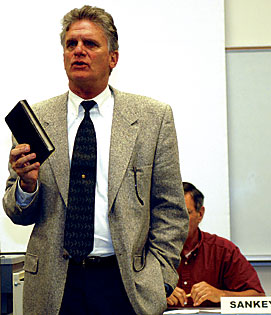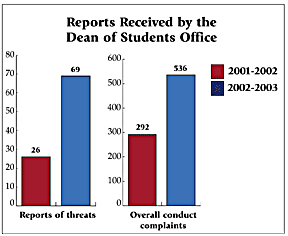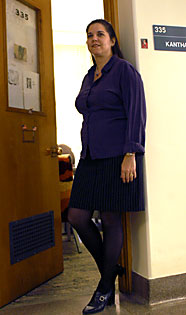 |
|
ADAM BAKER/Arizona Daily Wildcat
|
For months, faculty senators like Jeffrey Warburton debated language of a policy meant to establish procedures for dealing with students who make threats. The policy, which the senate finally passed earlier this month, was prompted by the threatening statements Robert S. Flores Jr. made toward his professors long before last year's shooting.
|
|
|
By Devin Simmons
Arizona Daily Wildcat
Tuesday, October 28, 2003
At any moment Saundra Taylor will get a call notifying her that there has been a disaster.
"No one knows when it will be," said Taylor, senior vice president of campus life and chair of the Campus Emergency Response Team.
Fortunately, in this case it is just a drill. At some point this semester the Tucson Police Department, in conjunction with UAPD, will stage a mock disaster. It could be anything: an explosion, a bio-terrorism attack, a shooting.
The drill is designed to test the emergency response systems at the UA, most specifically in the CERT network, Taylor said.
"This is designed to test the community's plans in case of a disaster, to find the strengths and weaknesses," Taylor said. "An amazing amount of planning has gone into this. We don't want to do it in a way that is so real it scares people."
For most people, horror is seen only on TV, in the form of an airplane crashing into a skyscraper, or a car bomb ripping through a crowded market. It's real but kept at a safe distance.
But for those in the College of Nursing, and for the university as a whole, the new reality is that you are never safe, and that you must prepare yourself for the worst.
 |
|
Ten or 15 years ago you could joke about having a bomb in your briefcase. Today you make a joke like that and you sit, you don't fly. No one messes with the folks in the airlines. The university culture needs to change in the same way, we need to be less tolerant of threatening behavior
- Peter Likins
UA president
|
 |
"You are not totally safe, not ever," said Stephanie Schneck, a pre-pharmacy sophomore.
One year ago today, Robert S. Flores Jr., a disgruntled nursing student, military veteran and father of two, made his way into a crowded classroom in the College of Nursing, with one gun in hand and four others in a backpack.
"I'm going to give you a lesson in spirituality," he said to professor Cheryl McGaffic before fatally shooting her twice in the chest.
Associate professor Barbara Monroe was hiding under a desk. When Flores made his way over to her, he asked her if she remembered the last thing that she had said to him. She said, "No."
"Are you ready to meet your maker?" he replied and then shot her three times.
He had killed professor Robin Rogers in her office before entering the classroom.
"I can't imagine how someone could hate their teachers so much," Schneck said. "Something like that reminds you that things can happen at any time."
Eyes wide open
In the year that has passed, the changes that have taken place in this community are as broad and complex as a disaster drill and as minute as a professor making sure to highlight the phrase, "turn off cell phones" on a class syllabus.
When Kristin Kanthak, an associate professor of political science, reorganized her office, she made sure to leave enough room between her desk and the wall so that she could escape easily.
"It's awful, but it's a concern," Kanthak said.
Whenever she thinks she is going to have a potentially difficult conversation with a student, she makes sure to tell her fellow professors across the hall to keep their heads up.
It's not that she cringes when she has to give a student a failing grade; it's just that she is more sensitive - and her students are, too.
She recalled an instance when a student approached her and said, "I don't want to scare you, but I want to talk about my grades."
The increase in people's awareness levels has been the biggest and most important change, Taylor said.
"Just like after 9/11, our whole society is changing," Taylor said. "People are being more vigilant because they realize they are more vulnerable."
|
Springing into action
Policies and procedures enacted since the nursing college shootings
·Policy on Threatening Behavior by Students
·Interim Policy on Disruptive Behavior in an Instructional Setting
·Policy on Violence in the Workplace
·"Arizona Idols" video
·Software upgrade to file reports of threat or harm
·Mock disaster drills
·Looking into hiring a threat assessment consultant firm to develop procedures for identifying and managing violent behavior
·Funds for emergency response expenses
·Full-time staff position to coordinate disaster response and CERT efforts.
·Evacuation plans for every classroom on campus
|
|
Reports of threats or harm have more than doubled in the last two years.
During the 2001 - 2002 school year, there were 26 reports compared to 69 reports last year, according to figures released by the Dean of Students office this month.
A new level of awareness has resulted in an 84 percent increase in overall conduct complaints, from 292 in 2001 - 2002 to 536 last year, said Veda Kowalski, associate dean of students.
President Peter Likins related the evolving campus atmosphere to what is occurring in the airline industry.
"Ten or 15 years ago you could joke about having a bomb in your briefcase. Today you make a joke like that and you sit, you don't fly," Likins said. "No one messes with the folks in the airlines. The university culture needs to change in the same way, we need to be less tolerant of threatening behavior."
The Dean of Students office has developed a software program that will more efficiently store reports of threatening activity and automatically indicate when an individual has more than one report on his or her record, Taylor said.
Media reports after the shooting revealed that Flores had a discipline problem for several years, frequently speaking out in class, performing poorly on tests and papers and complaining about the stress of carrying a full-time job and caring for a family.
At one point McGaffic told him his behavior was unacceptable, to which he replied, "I am doing better than I used to. In the past I would have bashed someone's head against a curb."
Another report filed with UAPD by nursing faculty said that Flores had made comments about "ending it all" and maybe trying to "put something under the college."
None of these reports got back to the Dean of Students office.
In order to make sure someone like Flores doesn't fall through the cracks in the future, the UA has developed a policy on threatening behavior to give faculty and staff clearly outlined steps for dealing with difficult situations.
The policy amplifies what is already stated in the Code of Conduct, Kowalski said.

"There have been so many times over the years where teachers were left asking 'What should I do?'" said Tina Deemer, coordinator of academic programs for the Department of Mathematics. "People didn't realize that something could be done. Now there is something in place."
The math department has had a history of threatening and difficult students who are disgruntled with the general education requirements, Deemer said.
Professors are trying to draw a line, she said. There have been instances where students have said out loud how ridiculous their grades were when tests were handed back.
Those students have been pulled aside immediately.
"We are trying to nip that kind of behavior in the bud, before it becomes something worse," Deemer said.
Melissa Vito, dean of students, said the biggest challenge for her department has been trying to find an effective way to bring the issues surrounding disruptive behavior to light without sounding too preachy and without being overbearing.
"Our goal is not to impose sanctions on people," Vito said. "It's just to heighten awareness."
The "Arizona Idols" video is a good example of the university's attempt to reach out to students on a level they can relate to, Vito said.
The 12-minute video, funded in part by Pepsi and formatted after the popular TV-show "American Idol," was shown to incoming freshmen at orientation.
The Dean of Students office conducted a survey of faculty and students before it made the video to determine what the campus community considered to be disruptive behavior, Vito said.
"Through the process of creating the video we found faculty aren't the only ones that don't like disruptions," Vito said. "Students don't like them either."
Reaching out
In a 22-page letter Flores sent to the Arizona Daily Star, published days after the shooting, he
complained about what he perceived to be a lack of caring in the College of Nursing.
Flores cited one case where Monroe gave him a failing grade in her class, saying that he was unsafe. He said that his failing grade made it impossible to pay for student loans and renew his nursing license.
"Ms. Monroe stated that 'It doesn't matter,'" he wrote in the letter. "The worse insult arrived when she stated I was unsafe. That was the biggest insult."
Students who were in the room when Flores shot Monroe remember him saying to her, "Well it does matter to me."
All students face the difficult challenges of balancing school and other responsibilities. Part of the college experience is learning how to deal with it, said Andriana Ledesma, a senior majoring in Spanish.
"You have to learn how to manage your time and work things out," Ledesma said. "Things do get a little crazy, but I don't expect professors to cater to my every need."
Jimmy Klepek, a Latin American studies graduate student who has taught Spanish classes in the past, said that fostering communication between students and teachers is vital.
"I think it is definitely an important part," Klepek said. "We're here to help students succeed, part of that is helping them through their personal problems."
This past summer the English department organized a difference and inequality workshop designed to make teachers more aware of the way that they say and do things and how it affects people, said Michele Grant, a graduate assistant who is teaching English 101 this semester.
 |
|
DAVID HARDEN/Arizona Daily Wildcat
|
When political science professor Kristin Kanthak reorganized her office she was sure to take many things into consideration, including arranging her desk in a way that would ensure a quicker escape in times of trouble.
|
|
|
In one instance, graduate assistants were asked how they would react if they received a short story written by a student that described a teacher being raped by her student.
"The goal was to prepare teachers for the worst," Grant said. "But I have never really had anything reach even an eighth of that level of intensity."
For Grant, simply communicating with students can go a long way toward soothing their fears over grades and avoiding potentially dangerous situations.
"In a student's mind so much depends on making the grade," Grant said. "For some it can be a matter of life and death."
She gave an example of a student in one of her classes who overdosed because she was having difficulty dealing with the stress. During her next class, Grant decided to throw out the lesson plan and talk about what everyone did over the weekend.
Since then students in her class have really opened up and a sense of community has been created.
"It's about having open dialogue with each other," she said. "Students have things they want to tell you. They want to talk to us."
Karen Smoots, a biology freshman, said that over the past year she has made a more concerted effort to get to know her professors.
"It's a level of motivation," she said. "Your parents aren't there to push you, but they (professors) are there to help."
Trauma like that faced a year ago is something that can bring us together or tear us apart, Likins said.
"As a president you discover in the fires that you need to act quickly and firmly," he said. "As a community we did that well. This tragedy has brought us together."
